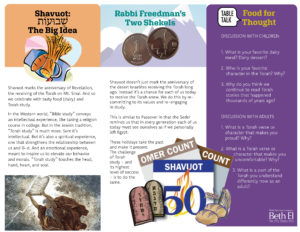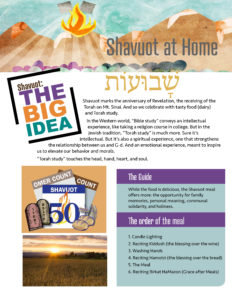

Rabbi Shai Held, one of the most influential Jewish thinkers and leaders in America, is President and Dean of the Hadar Institute in New York City. Rabbi Held received the prestigious Covenant Award for Excellence in Jewish Education, and he has been named multiple times to Newsweek’s list of the most influential rabbis in America and to the Forward’s list of the most prominent Jews in the world. He is the author of Abraham Joshua Heschel: The Call of Transcendence, The Heart of Torah: Essays on the Weekly Torah Portion, Judaism is About Love.

7:00 pm Reception & Book Signing
7:30 pm Evening Minyan
8:00 pm Rabbi Shai Held will introduce the central themes of his new book in conversation with Professor Arnold Eisen, chancellor emeritus of The Jewish Theological Seminary and professor of Jewish Thought.
REGISTER AT https://www.hadar.org/learn/classes-events/hadar-chicago-r-shai-held-book-talk-0.
7:00 pm “Who Has Not Forgotten His Hesed?” Doing Theology (and Ethics) with the Book of Ruth with Rabbi Shai Held
8:00 pm Mincha
8:09 pm Candle lighting
8:15 pm Ma’ariv
8:30 pm Kiddush & Motzi
9:00 pm How Do We Love God? Voices from the Jewish Tradition with Rabbi Shai Held
10:00 pm Dessert Reception
10:30 pm Study Session with Rabbi Michael Schwab
11:30 pm Snack Break
If you are planning to attend the Shavuot Lectures, Tikkun Layl Shavuot Study Sessions and/or the Sunrise Service & Bagel Breakfast, please register at https://nssbe.shulcloud.com/form/tikkun-layl-shavuot-2024.html
12:00 – 4:30 am Tikkun Layl Shavuot Study Sessions
4:45 am Sunrise Service & Bagel Breakfast
9:00 am Festival Service
10:30 am Junior Congregation
11:00 am Shavuot Pray and Play
8:15 pm Mincha
9:20 pm Ma’ariv
9:21 pm Candle lighting
If you are planning to attend the Shavuot Lectures, Tikkun Layl Shavuot Study Sessions and/or the Sunrise Service & Bagel Breakfast, please register at https://nssbe.shulcloud.com/form/tikkun-layl-shavuot-2024.html
9:00 am Festival Service – D’var Torah by Rabbi Shai Held
10:30 am Junior Congregation
11:00 am Shavuot Pray & Play
8:15 pm Mincha
9:20 pm Ma’ariv
9:21 pm Holiday Ends
Questions? Contact Rachel Kamin, Director of Lifelong Learning, at rkamin@nssbethel.org or 847-926-7902.
Beth El’s online learning and resources brings our favorite Jewish traditions to your table.
When the holidays come around, print out a few “Table Talks” to display on the table to spark a holiday-themed conversation.
Print out the “…At Home” guides for ritual instructions, blessings, teachings, ideas, and more.
 |
 |
| Shavuot Table Talk – click on link to open and print | Shavuot at Home – click on link to open and print |
From My Jewish Learning
Shavuot, the “Feast of Weeks,” is celebrated seven weeks after Passover (Pesach). Since the counting of this period (sefirat ha-omer) begins on the second evening of Passover, Shavuot takes place exactly 50 days after the (first) seder. Hence, following the Greek word for “fifty,” Shavuot is also referred to sometimes as Pentecost. Although its origins are to be found in an ancient grain harvest festival, Shavuot has long been identified with the giving of the Torah on Mount Sinai.
Shavuot History
Shavuot combines two major religious observances. First is the grain harvest of the early summer. Second is the giving of the Torah on Mount Sinai seven weeks after the exodus from Egypt. The first determines the ritual for the holiday, which was one of the three pilgrimage festivals of ancient Israel, when Israelite males were commanded to appear before God in Jerusalem, bringing offerings of the first fruits of their harvest. The second determines the significance of the holiday for Judaism, tying it in with the seminal event of Jewish religious memory, namely the entering into a covenant between God and Israel, exemplified by Israel’s assumption of Divine law.
Shavuot at Home
Since Shavuot is an ancient pilgrimage holiday, it is not surprising that its ritual focuses on the community. Nonetheless, there are a number of customs associated with personal practice. Chief among them is the eating of dairy products on Shavuot. Although the reasons for this custom are not completely clear, it has become traditional to eat milk and cheese products as part of the celebration of Shavuot.
In the Community
Much of the observance of the holiday centers on the synagogue and its rituals. The special readings for the holiday include medieval poems (piyyutim) and the Book of Ruth. A number of reasons are given for the inclusion of the latter. Among them are that the book takes place at the time of the barley harvest, that Ruth’s assumption of Naomi’s religion reflects the Israelites’ acceptance of the Torah at Sinai, and that King David, who is alleged to have died at this time of year according to rabbinic tradition, is mentioned at the end of Ruth. Another tradition is to participate in a Tikkun Leil Shavuot, an all-night study session marking the holiday. And finally, Shavuot is one of the holidays on which both Hallel, the Psalms of Praise, is recited and Yizkor, the memorial service, is observed.
Shavuot Themes and Theology
By associating an ancient holiday of the grain harvest with the exodus from Egypt, Jewish tradition has imbued Shavuot with religious significance derived from the foundational event in Jewish historical consciousness. In the specific case of Shavuot, this takes the form of the entering into a covenant or formal agreement between God and Israel at Mount Sinai. This is a joyous time, since it is the moment at which God and Israel entered into a figurative marriage with each other, the hopeful springtime of their relationship.